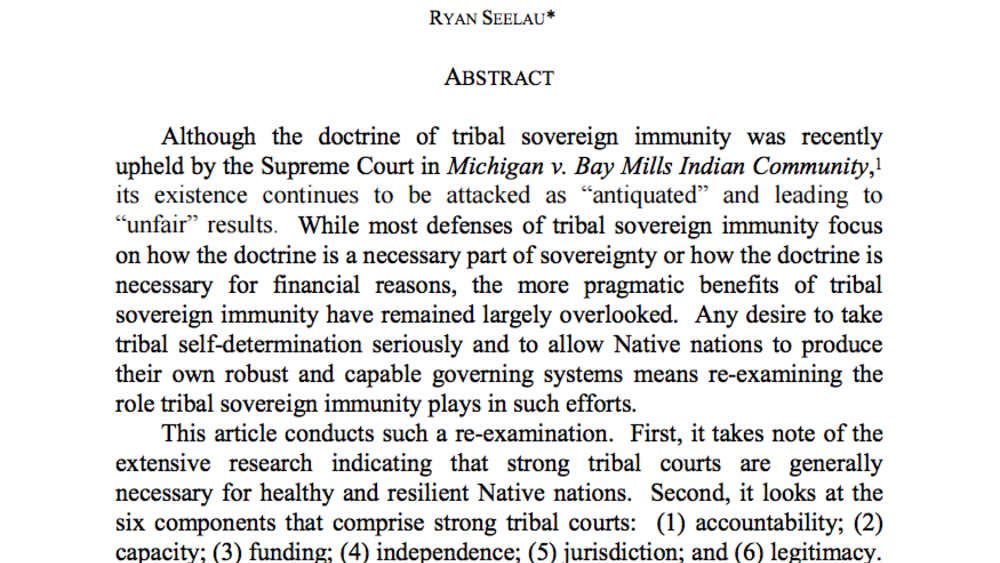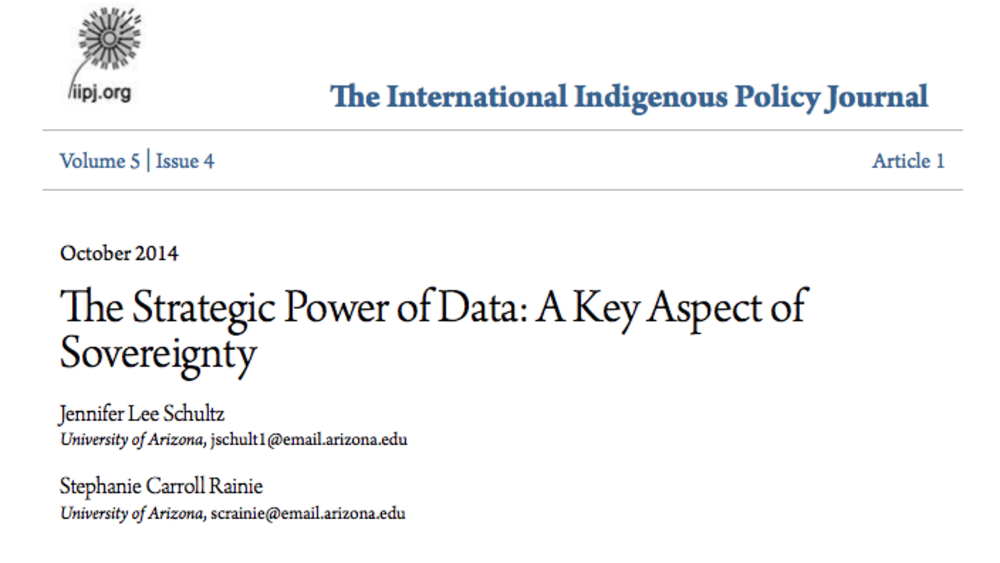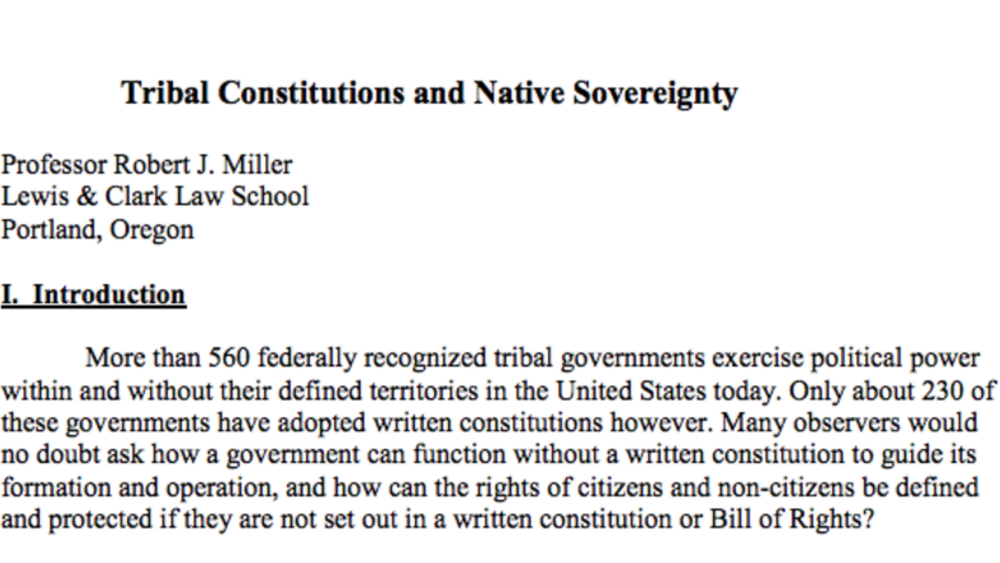Native leaders speak to the notion that Native nations' best defense of their sovereignty is the demonstration of their ability to exercise that sovereignty effectively.
Additional Information
Diver, Karen. Native Nations Institute for Leadership, Management, and Policy, University of Arizona. Tucson, Arizona. September 17, 2009. Interview.
Fullmer, Jamie. Native Nations Institute for Leadership, Management, and Policy, University of Arizona. Tucson, Arizona. June 17, 2008. Interview.
Gilham, Greg. Native Nations Institute for Leadership, Management, and Policy, University of Arizona. Tucson, Arizona. March 25, 2010. Interview.
Gipp, David. Native Nations Institute for Leadership, Management, and Policy, University of Arizona. Tucson, Arizona.
Gray, James R. Native Nations Institute for Leadership, Management, and Policy, University of Arizona. Tucson, Arizona. September 17, 2009. Interview.
Hicks, Sarah. "NCAI and the Partnership for Tribal Governance." Honoring Nations symposium. Harvard Project on American Indian Economics, John F. Kennedy School of Government, Harvard University. Cambridge, Massachusetts. September 18, 2009. Presentation.
Sampsel, Roy. Native Nations Institute for Leadership, Management, and Policy, University of Arizona. Tucson, Arizona. August 31, 2010. Interview.
Wilkins, David E. Native Nations Institute for Leadership, Management, and Policy, University of Arizona. Tucson, Arizona. August 6, 2008. Interview.
Transcript
Greg Gilham:
"Most nations proclaim their inherent sovereignty. But without action, all it is is a proclamation. So at some point in time, you've got to develop a way of exercising it in order for it to work."
David Wilkins:
"Vine [Deloria] was always saying just that in his many writings about tribal sovereignty, encouraging tribes all along, dating back to Custer Died for Your Sins and even when he was Executive Director of NCAI [National Congress of American Indians], to quit talking and to get out there and start acting, to start exercising, to start wielding the residual inherent sovereign powers that you still have. He said, 'They're all there, and if you don't wield them, if you don't use them, in their dormant state, they atrophy.' When something atrophies in this society, it eventually becomes brittle and it breaks away and someone from the outside swoops in and just takes it away, because they say, 'You're not exercising it, you're going to lose it.' It's the old water law doctrine: either you use it or you lose it. And I think that's what Vine, and certainly what Oren Lyons, is referencing there. That's where I think tribes today are really doing some wonderful things."
Sarah Hicks:
"There are many issues where, if we don't deal with them ourselves, we know that the federal government will intervene. Where there's a perceived vacuum around policy making, the federal government will intervene to develop policy, and so if we aren't developing our own policies, if we aren't making sure that county and state and federal governments know about the policies that we're developing, there's a real danger there."
Jamie Fullmer:
"Sovereignty is indeed is the act thereof. But it is also understanding that it's important for us to redefine it as time allows us. There are things that we as Indian tribes and nations couldn't do 20 years ago that we can do now because people are willing to exercise and express the sovereignty and push the boundaries. And really those leaders and those tribes that took on those challenges, those spearheads, allowed the rest of us to be able to stretch our own boundaries."
David Gipp:
"Well I think in this day in age when we deal with the U.S. government, or the tribal nations that deal with both the U.S. government, with state government, then all the creatures of the state as they say -- I think it is very important for us to utilize what that sovereignty is all about. Whether we do it through law enforcement, whether we exercise it in commerce, or whether we exercise it through our courts, or if we do it with our resources such as water. Those kinds of things have to be done if we're going to maintain and, for that matter, amplify our sovereignty. If you don't use it, you lose it, is, I think, part of the issue. And that is something that is very evident when we talk about things like court cases."
Karen Diver:
"To me, that really means, once again building those capable institutions. Everybody likes to know what are the rules that we're playing by, especially if you're dealing with outside entities that you do work with, whether it's governmental or through your economic development efforts. But also, that you're defining what those rules are. And whether you're dealing with a local unit of government, the feds, bankers, auditors, you know, they don't get to define the playing field. You're defining the rules, you're communicating them, and you're saying that 'Your work with us is going to be defined by us.'"
Jim Gray:
"I think that's an excellent point. I think a lot of tribes, certainly during the last century, really operate under the notion that if you stay quiet, if you stay under the radar screen, they'll leave you alone. And I think what is happening in the last generation of tribal leaders and tribal governments is that they've kind of broken out of that model and have taken the initiative to states, to the federal government, to the communities in their area and say, 'You know, we have the ability to help solve community-wide problems. We have the ability to address the social problems we have in our community.' We now -- in other words, instead of blaming somebody else and just operating under the radar screen, we're taking just the opposite approach, which is taking the fight to the streets and taking, and using the sovereignty of the nation to create programs and departments and initiatives that actually address the needs of our community."
Roy Sampsel:
"I think the tribes have been fortunate in that they have recognized that they have the ability to be self-determined and to exercise and to use their sovereignty. The question now is, 'Do they have to governance structures in place that allow them to make good decisions over time, and to implement their wishes into programs that actually deliver effectively?' That's the challenge, it seems to me, of the tribes since the seventies. But even more importantly, it'll be the challenge over the next few decades."



